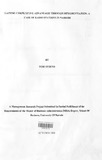| dc.description.abstract | Organizations are open systems, that is, changes in the environment shape opportunities
and challenges facing the organizations. Studies carried out before liberalization indicates
that the reform process has led to stiff competition in key sectors of the economy (Bett
1995, Kombo 1997, Owiye 1999, Njau 2000, and Murage 2001). Decisions generate
action that produces results. Organizational results are the consequences of the decisions
made by its leaders.
The framework that guides and focuses these decisions is strategy. The framework that
guides competitive positioning decisions is called competitive strategy. According to
Bourgeo, (1980) the purpose of a competitive strategy is to build a sustainable
competitive advantage over an organization's rivals. A competitive strategy defines the
fundamental decisions that guide the organization's marketing, financial management and
operating strategies.
This was a descriptive survey with the objectives of determining the relationship between
differentiation strategy and competitive advantage, determining the differentiation
strategies adopted by radio stations in Nairobi and identifying the challenges faced in
implementing differentiation as a competitive strategy. A questionnaire was used to
collect data which was administered using drop and pick method to the management of
various radio stations. Data was analysed using descriptive statistics and correlation.
The study found out that there is a relationship between differentiation strategy chosen by
the radio stations and competitive advantage. These findings have implications for the
media houses, the management of radio stations and academics. | en |

